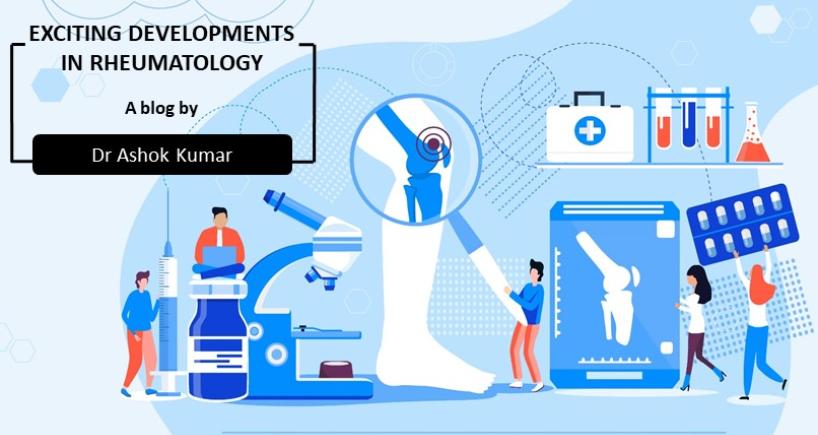
Rheumatology
Exciting Developments In Rheumatology
Dr. Ashok Kumar Feb 06, 2020

Although rheumatology is well known among medical fraternity, most patients do not seem to have heard of this specialty when they are told that they need the expertise of a rheumatologist. This may come as a surprise in the `google era’ that we are living in! Quite interestingly, there are occasions when even medical professionals may wonder whether to refer a given patient to a rheumatologist. This is because many times, a `rheumatological’ patient suffers from a `multi-organ’ disorder with perplexing symptoms and signs. Simply defined, rheumatology deals with diseases of joints and their adjoining structures like ligaments, tendons, cartilages and muscle attachments on bones (`entheses’). The generic name `arthritis’ is used for a disease, which mainly affects the joints (e.g. knuckles, wrists, elbows, shoulders, knees, ankles etc). Examples of arthritis include rheumatoid arthritis, spondyloarthritis (also called ankylosing spondylitis), psoriatic arthritis, chikungunya arthritis and reactive arthritis. The affected joint becomes painful and often swollen as well as stiff. If not treated early enough, the joint may become irreversibly damaged, resulting in deformity. A common ailment, which causes knee pain in the elderly, is called `osteoarthritis’. It has been recognized as a disease of aging and may thus appear to result from wear and tear of knee joints. However, it can sometimes affect younger individuals. Osteoarthritis is, in fact, the commonest form of arthritis on worldwide basis.
It is important to recognize that rheumatic diseases may cause symptoms beyond joints (`extra-articular’ symptoms). Examples include prolonged fever, fatigue, skin rashes, skin ulcers, mouth ulcers, excessive hair-fall, nodules under the skin, painful blueness or blackening of finger-tips (gangrene), cough, breathlessness, tingling or numbness of fingers and toes, dry eyes, dry mouth, paralysis of a body part, blurring/loss of vision, nose-bleed, bloody urine or stool etc. These so called extra-articular symptoms may occur in a patient who has obvious features of arthritis or they may occur in the absence of any joint complaints, whatsoever. Examples include SLE, Sjogren’s syndrome, dermatomyositis, polymyositis, scleroderma, vasculitis and so on. Rarely, rheumatic diseases can cause life-threatening complications.
There are more than hundred rheumatic disorders with a prevalence, which varies from 15% to 0.001% in the community. Many of these require special, often expensive laboratory tests and their proper interpretation. It is a wrong notion that rheumatic diseases are untreatable. In fact, most cases are eminently responsive to modern treatment so that a good quality of life can be achieved. The key to success is early diagnosis and treatment. In recent years, there has been a lot of new drug development in the field of rheumatology. Most notable among these are biological drugs such as TNF inhibitors (e.g. etanercept, infliximab, adalimumab and golimumab) and anti-B cell therapy (rituximab). Another class of drugs is called JAK inhibitors (e.g. tofacitinib and baricitinib). These developments have transformed the quality of life of patients with rheumatoid arthritis and ankylosing spondylitis. Although the high cost of these drugs has been a major limiting factor, recently `biosimilar’ drugs have entered the Indian market, providing the much-needed relief. These drugs are equally effective and economically priced. In fact, India is currently the global hub for biosimilar drugs. This augurs well for the rheumatology community.
Early diagnosis of rheumatic diseases, most notably, rheumatoid arthritis is of paramount importance. In many patients, the initial period of 6 months to a year, is precious with regard to commencing appropriate treatment. If this is lost, irreversible damage to joints can occur. Greater awareness amongst patients about the availability of effective treatment is needed in our country. Admittedly, there is shortage of rheumatologists in India at present but the situation is steadily improving with availability of more training centres.
Categories
Clear allਡਾਕਟਰ ਨੂੰ ਮਿਲੋ
Dr. Ashok Kumar
DIRECTOR RHEUMATOLOGY | Fortis Vasant Kunj
- Rheumatology | Rheumatology
-
40 Years
-
1500










